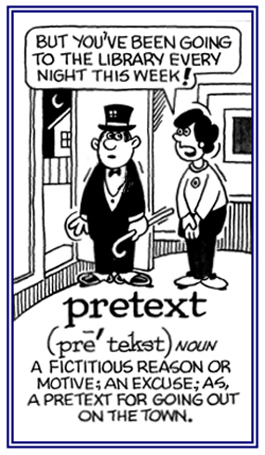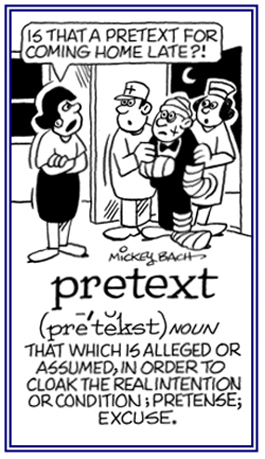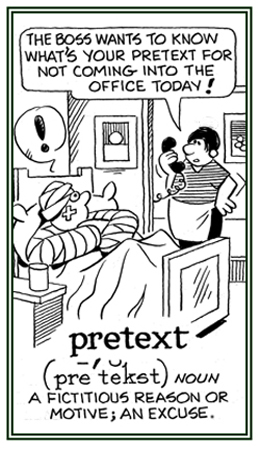text-, tex-
(Latin: to weave, woven; to structure, to make)
A text without a context is nothing more than a pretext.
1. An ancient way of writing manuscripts and other inscriptions in which, rather than going from left to right as in modern English, or right to left as in Arabic, alternate lines must be read in opposite directions: "As a student of ancient writings, Jamie was interested in the boustrophedon texts that he discovered in some classical documents."
2. Etymologically these words come from Greek βους, "ox" and στρεφειν, "to turn", because the hand of the writer went back and forth like an ox drawing a plow across a field and turning at the end of each row to return in the opposite direction.
2. Etymologically these words come from Greek βους, "ox" and στρεφειν, "to turn", because the hand of the writer went back and forth like an ox drawing a plow across a field and turning at the end of each row to return in the opposite direction.
1. A discourse that surrounds a language unit and helps to determine its interpretation.
2. The words, phrases, or passages that come before and after a particular word or passage in a speech or piece of writing and help to explain its full meaning.
3. The set of facts or the circumstances or events that form the environment within which something exists or takes place: Warren kept talking about the historical context of his childhood.
4. The parts of a written or spoken statement that precede or follow a specific word or passage, usually, influencing its meaning or effect: Carl told Bettie that she misinterpreted his remark because she took it out of its context.
5. A data structure used to transfer electronic data to and from a business management system.
6. When referring to archeology, context is the spacial relationship an object has to other objects in the ground.
2. The words, phrases, or passages that come before and after a particular word or passage in a speech or piece of writing and help to explain its full meaning.
3. The set of facts or the circumstances or events that form the environment within which something exists or takes place: Warren kept talking about the historical context of his childhood.
4. The parts of a written or spoken statement that precede or follow a specific word or passage, usually, influencing its meaning or effect: Carl told Bettie that she misinterpreted his remark because she took it out of its context.
5. A data structure used to transfer electronic data to and from a business management system.
6. When referring to archeology, context is the spacial relationship an object has to other objects in the ground.
Artifacts found in context are interpreted as having the same functions or characteristics as the other objects associated with it; artifacts found out of context are difficult, if not impossible to interpret.
The act or practice of quoting somebody out of context is usually done in order to give a false impression of what he or she actually said.
contextual (adjective), more contextual, most contextual
A reference to the involvement or dependence on the contents of a discourse that surround a word or passage and can produce better understanding about its meaning.
contextually (adverb), more contextually, most contextually
Descriptive of a manner relating to the situation or location in which information was found: The project that Shareen is involved with aims to contextually develop her ability to complete the objectives successfully for her supervisor.
contextural
Pertaining to contexture or the arrangement of parts; producing contexture; interwoven.
contexture
1. The act of weaving or assembling parts into a whole.
2. An arrangement of interconnected parts; a structure.
2. An arrangement of interconnected parts; a structure.
cryptotext
The text part of a message that is in a coded form.
1. A misleading or untrue explanation given for doing something in an attempt to conceal the real reason: Sabina went back to her boyfriend's apartment with the pretext that she had forgotten her purse.
2. An effort or strategy intended to conceal something: Frank had a pretext that the heavy traffic kept him from getting to work on time, however it was really because he didn't get up in time.
3. Etymology: from Latin praetexere, "to disguise, to cover"; from prae-, "before" + texere, "to weave."

© ALL rights are reserved.

© ALL rights are reserved.

© ALL rights are reserved.
Go to this Word A Day Revisited Index
2. An effort or strategy intended to conceal something: Frank had a pretext that the heavy traffic kept him from getting to work on time, however it was really because he didn't get up in time.
3. Etymology: from Latin praetexere, "to disguise, to cover"; from prae-, "before" + texere, "to weave."



Go to this Word A Day Revisited Index
so you can see more of Mickey Bach's cartoons.
pretexting
Alleging something as an excuse.
The distribution of particles or elements in a mass of soil: Soil texture depends on the size of the mineral particles which also control aeration and drainage.
textile
1. Cloth or fabric that is woven, knitted, or otherwise manufactured.
2. Raw material used for making fabrics; such as, raw material that is used for making fabrics including fiber or yarn.
2. Raw material used for making fabrics; such as, raw material that is used for making fabrics including fiber or yarn.
An irrational dread of specific kinds of fabrics: Tracy, suffering from textophobia, couldn't stand to wear any woolen clothes or scarves because they scratched and irritated her skin, so she wore only apparel made from cotton or silk!
textrine: weaving
Of or pertaining to weaving.
textual
1. Relating to the way a book or piece of writing is written.
2. Consisting of words or text.
3. Of or relating to or based on a text.
2. Consisting of words or text.
3. Of or relating to or based on a text.
Showing page 1 out of 2 pages of 19 main-word entries or main-word-entry groups.

